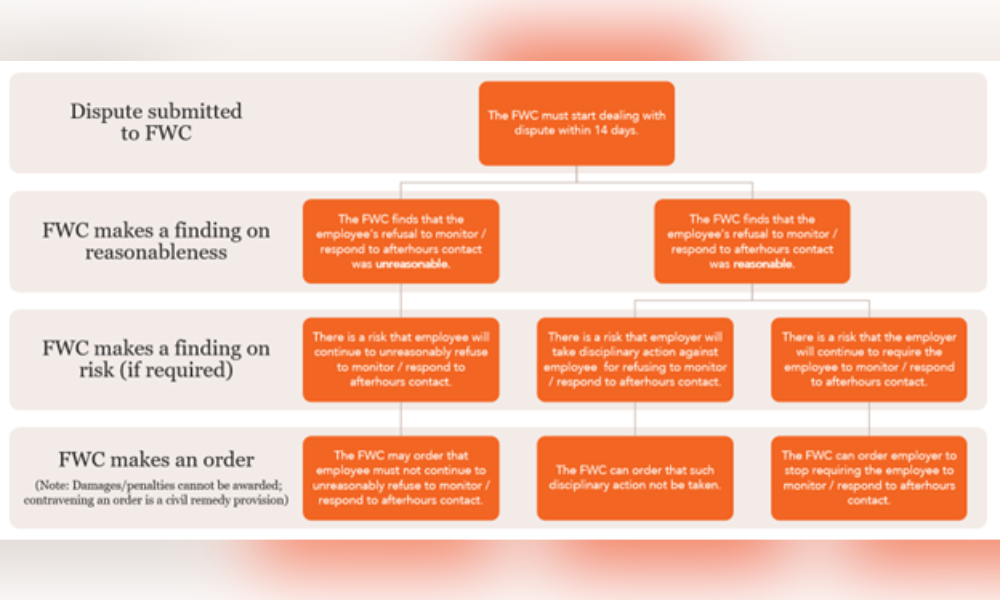
All modern awards now include 'employee right to disconnect' clause

Significant changes have come into effect with the commencement of the “right to disconnect” legislation, a transformative shift in rights aimed at addressing the growing concerns of work-life balance. This legislation grants employees the legal right to disengage from work-related communications and tasks outside of their working hours without facing any negative consequences.
growing concerns of work-life balance. This legislation grants employees the legal right to disengage from work-related communications and tasks outside of their working hours without facing any negative consequences.
As remote work and flexible hours become more prevalent, this move is seen as a crucial step towards ensuring that employees can completely unplug, aiming to foster a healthier, more sustainable approach to work.
In this article we will discuss the practical considerations of these changes, and the Fair Work Commission’s process for resolving disputes.
The Fair Work Commission has now varied all modern awards to include an “Employee right to disconnect” clause. It is important for employers to review the clauses relevant to their employees as they may have information specific to their industry/occupation – particularly in relation to on-call, recall, stand-by or emergency roster changes.
Through consultation with your employees, you can establish what the current practices are in the business. This may assist you to determine necessary and unnecessary afterhours contact. The right to disconnect can be seen as a psychosocial health and safety issue, which under the Work Health and Safety Act 2011 and the Managing the risk of psychosocial hazards at work Code of Practice 2022 requires employee consultation.
In conducting this review, you should also consider provisions in employees’ current contracts and position descriptions. What do they say about how available the employee will make themselves? It may be necessary to seek legal advice to amend those provisions to specify any expectations/requirements for afterhours availability and, if necessary, include a reference to any policy (see below). Employees’ remuneration levels should also be reviewed to ensure they are adequately compensated for being required to be contactable after hours. Award provisions should also be considered for overtime that could be triggered as a result of after-hours contact, for example.
Through consultation with employees, employers could develop a policy that deals with the right to disconnect and sets out, for example, which roles are required to monitor, read, and respond to after-hours contact in relation to certain issues. This arguably will make it clear to the workforce who can reasonably be contacted after hours, and detail the usual arrangements for making contact as required by the model modern award clause for employees covered by an award.
We recommend that any policy should:
Managers should receive training on this new “right,” including on:
They should also be encouraged to have discussions with their team members to identify when contact may reasonably be made, and to encourage employees to raise any concerns with them.
Those in leadership positions should lead by example and not send emails out of hours unless necessary or contemplated under the employer’s policy.
Technology may assist with regulating after-hours contact – for example, a business may:
The Fair Work Commission will publish guidelines in relation to the right to disconnect under the FW Act. The Fair Work Commission has indicated that it will publish guidelines once some cases have been heard.
Disputes regarding whether the employer or employee have acted reasonably in relation to the right to disconnect are to be dealt with by the Fair Work Commission, and an order can be applied for by either an employee or an employer.
The Fair Work Commission’s process of dealing with a dispute is set out below:

If an application is made to the Fair Work Commission for an order, the Commission may deal with the dispute however it considers appropriate, including by mediation, conciliation, making a recommendation, expressing an opinion, or arbitration. We expect in most instances, a dispute will initially be dealt with (and most often resolved) by conciliation.
The dispute resolution process outlined above is the main legal remedy for an employee who is concerned about their right to disconnect. Breaching an order of the FWC will be a civil remedy provision.
The right to disconnect is also a workplace right under the FW Act. Employers must therefore not take adverse action (detrimental action) against an employee for exercising that “right” under the general protection provisions of the FW Act.
Breaching the general protections provisions or modern awards can result in damages and civil penalties, currently up to $18,780 per contravention for an individual involved in a contravention, $93,900 per contravention for a company with less than 15 employees, and $469,500 per contravention for a company with 15 or more employees. Therefore, if an employee refuses to respond to after-hours contact, and an employer considers this unreasonable, the employer should consider (and seek legal advice on) whether it is better to engage with the dispute resolution process under the FW Act (outlined above) before considering any disciplinary action.
The right to disconnect has already been considered in a recent workers’ compensation matter. In Brennan v. BWP [2024] NSWPIC 165, the Tribunal Member criticised an employer for continued attempts to contact an employee when they were on short-term sick leave, stating this was not reasonable action by the employer, and noting the proposed right to disconnect.
Adele Garnett is a Special Counsel in the Workplace and Employment practices at HopgoodGanim in Brisbane.